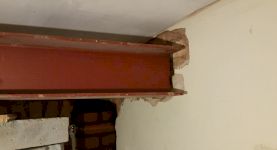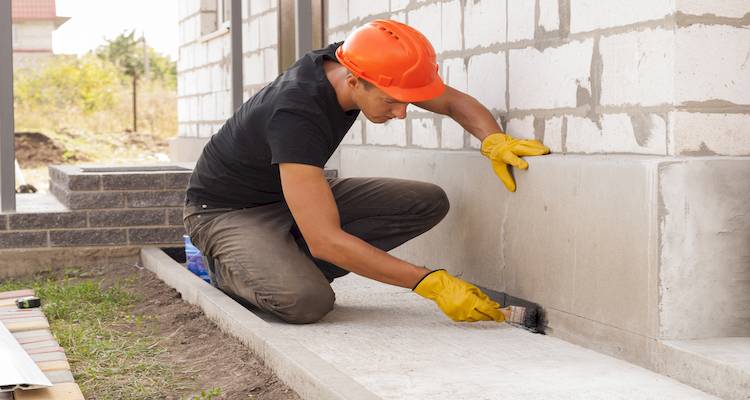Floor Tiling Cost
- The average cost of laying a tiled floor is around £700.
- It will take approximately 1 to 2 days to complete depending on the complexity.
- How much it costs to tile a floor, including different types of floor tiles and their costs.
- Simple calculator for you to quickly estimate floor tiling costs.
- How long laying floor tiles takes, and any additional jobs to action at the same time.
- How much a tiler will charge for different-sized floors.
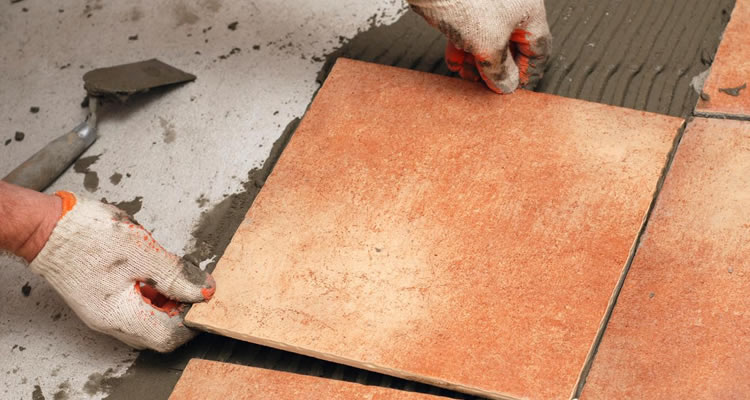
£700
Table of Contents
- How Much Does Tiling a Floor Cost?
- Floor Tiling Costs (Supply Only)
- Additional Floor Tiling Costs
- Labour Cost of Laying Floor Tiles
- How Long Does Tiling a Floor Take?
- How to Tile a Floor
- Choosing Floor Tiles
- Cost of Removing Floor Tiles
- Are Tiled Floors Right For Me?
- Checklist: Hiring a Tiler in the UK
- FAQs
How Much Does Tiling a Floor Cost?
Trying to find out how much it will cost to tile a floor?
Whether it's your kitchen, bathroom, or any other room in your home, calculating your tiling costs is easy as the tiling cost per m² is fairly standard. The average floor tiling cost ranges between £400 to £1,000, depending on the size of the floor. A larger area will require more tiles and will take longer to install, so you can also expect the labour costs to increase accordingly.
What else does this guide contain?
In this ultimate guide, we break down the prices of different tiling materials and the costs for labour, including tiler day rates, making it easy for you to determine how much a new tiled floor will cost exactly.
Are you ready to get a free quote?
It couldn't be easier to get in touch with local professionals. Simply enter your project details into MyJobQuote and a wide range of tilers near you will get back to you with free, no-obligation quotes.
Would you like more details before getting started?
Read on below for everything you need to know about tiled flooring.

How Much Do Tilers Charge?
Popular in kitchens and bathrooms, floor tiles are a great flooring option for rooms with moisture. Not only do they look great, but they're also easy to clean - and, importantly, are resistant to water.
So, how much does it cost to tile a bathroom?
The cost of tiling a small bathroom floor can range from £300 to £600, depending on the complexity and type of tiles used. Ceramic floor tiles, in particular, are very popular and are generally larger and more robust than wall tiles as they are designed to withstand high foot traffic - although poor quality tiling may be more prone to general wear and tear.
Are tiles a good choice for someone on a smaller budget?
Tiles come in many different materials, shapes and sizes, but if you are working on a smaller budget, then simple square tiles are your best option. In addition to being cheaper to buy, simple square tiles are also easier and quicker to lay, so cost less if you are hiring someone to complete the job for you.
There is a huge variety of floor tiles available, with the costs depending on the type and quality. Popular tile types include:
- Ceramic
- Mosaic
- Porcelain tiles
The cost of laying floor tiles will depend on the type of tile that you choose and the size of the room. As an example, an 8m² room will cost around £400 to £500 to tile, and the job can usually be completed within a day.

In contrast, the average cost to lay tile in a 30m² room is around £900 to £1,000, and this will usually take approximately 1 to 2 days to complete.
These prices are based on an average-priced type of floor tile. The prices may vary depending on the cost of the tiles that you choose to install.
Floor Tiling Prices
Below are the estimated costs for hiring a tradesperson to fit mid-range £25/m² floor tiles in different-sized rooms:
| Room Size | Floor Tiling Cost | Duration |
|---|---|---|
| 8m² | £400 – £500 | 1 day |
| 12m² | £500 – £600 | 1 – 1.5 days |
| 20m² | £700 – £800 | 1 – 2 days |
| 25m² | £800 – £900 | 1 – 2 days |
| 30m² | £900 – £1,000 | 1 – 2 days |

The tiling costs per square metre can vary depending on the type of tile you are using, your location, and the overall size of the room. Using a floor tiling cost calculator can help you get more accurate estimates by factoring in the area to be tiled, material costs, labour, and any additional expenses.
Floor Tiling Cost Calculator
Floor Tiling Costs (Supply Only)
The type of tile that you choose for your flooring can affect the cost, as different types of tile have different price points. It is crucial to consider the type of tile used in any tiling project to estimate costs and budget effectively and accurately.
For example, you will pay somewhere around £15 to £25 per m² for a ceramic tile, whereas you will pay around £40 to £50 per m² for a marble tile.
Below are the average costs per square metre for different types of floor tile:
| Type of Floor Tile | Average Cost per m² |
|---|---|
| Ceramic | £15 – £25 |
| Porcelain | £15 – £30 |
| Cement | £20 – £30 |
| Marble | £40 – £50 |
| Mosaic | £25 – £35 |
| Limestone | £30 – £40 |
Additional Floor Tiling Costs
There are several additional costs that you may need to think about when it comes to tiling a floor. These can be other renovation jobs, including your tiler, that help you get the most out of your contractor while they're at your property.
- Floor Screeding - Before your tiler can install new floor tiles, it's important they have a smooth, flat surface to work with. If your existing floor is uneven or has been damaged by the removal of your original flooring, you may need to have your floor screeded beforehand. The cost of floor screeding is around £250, and can help to ensure your newly tiled floor lasts longer.
- Wall Tiling - For a seamless floor-to-ceiling aesthetic, you can have your walls tiled while your local tiler is at your property. With wall tiling costs averaging at about £585, it can be a worthwhile investment to futureproof walls in wet rooms like bathrooms, toilets, and kitchens.
- Bathroom Tiling - It's a good idea to spruce up both your bathroom's floors and walls at the same time if you're having one or the other tiled. Tiling is a great choice in wet rooms as the material is resistant to moisture, making it a long-lasting choice. The cost of tiling a bathroom commonly ranges from £600 to £800.
- Tiling a Shower - Why stop at tiling your bathroom walls? For a fully tiled shower enclosure, you can expect the costs of tiling a shower to be between £300 to £400, depending on the tile chosen and the intricacy of the pattern.
Labour Cost of Laying Floor Tiles
Labour fees generally amount to between 40% and 60% of your total cost, with the balance going towards materials, supplies and any additional overheads.
The average cost you can expect to pay a contractor to tile your floor is around £150 to £200 per day, although this can vary depending on size and complexity of the job.
Also, your location can impact the overall cost of labour for the job. Those based in London can expect to pay around £50 to £100 more per day for the cost of labour than those based in the North or other parts of the UK.
How long should I leave between tiling and grouting?
How Long Does Tiling a Floor Take?
The timescale required to tile a floor depends on the size of the area and the complexity of the job.
Smaller areas can potentially be completed within the same day, while larger or more complex projects can require several days, especially to allow time for adhesive to set before grouting.
Below is a typical breakdown of timescales:
| Job Size & Description | Typical Duration | Notes on Completion |
|---|---|---|
| Small room (up to 5 m²) | 1 day | Grouting is often completed the same day as the tiling, depending on adhesive curing. |
| Medium room (5 - 15 m²) | 1 - 2 days | Day 1 for tiling, day 2 for grouting (allowing time for adhesive to cure). |
| Large room (15 - 30 m²) | 2 - 3 days | Tiling and curing over 1-2 days, with grouting taking place on day 3. |
Other points to note in terms of timescale are as follows:
- Adhesive usually requires 12–24 hours to cure before you can start grouting.
- Therefore grouting is often done on a separate day to ensure a strong finish.
- Preparation for complex designs can take longer, with intricate patterns being more time consuming to lay.
- Weather conditions can also impact timings, particularly in regards to outdoor tiling.
How to Tile a Floor
If you want to save money on the job, you can tile a floor as a DIY job. This would work out much cheaper as you wouldn’t have to pay the costs of labour.

We have a how-to guide with step-by-step instructions on how to tile a floor.
However, if you want your floor to look as good as it possibly can, it’s probably best to leave it to the professionals. Also, if you’re limited on time, it may be better to hire professionals to do the work for you so that you don’t have to worry about the time it takes to get the work done.
If you have never tiled a floor yourself before, it might be quite a difficult job and can prove a challenge even if you're only covering a small area of flooring. This is due to requiring precision and attention to detail, not only with the physical laying of tiles, but also the finishing touches around the edges, corners and working around fixtures and fittings.
Choosing Floor Tiles
Below is a list of the different types of floor tiles and the pros and cons of each:
Ceramic Floor Tiles
This is one of the most common types of tile. It is very durable and goes well in many different types of rooms. It’s also easy to install, easy to keep clean and comes in many different styles and colours.

Pros
- ✔ Durable
- ✔ Comes in many styles
- ✔ Comes in many colours
- ✔ Easy to install
- ✔ Easy to keep clean
- ✔ Budget-friendly
Cons
- ✖ Doesn’t look as natural as some other tile types
Porcelain Floor Tiles
This is another common type of tile in the home, but this one has more of a natural look. These tiles come in a variety of colours and styles to match your home, and they're easy to maintain and keep clean.
Pros
- ✔ Comes in many colours
- ✔ Comes in many styles
- ✔ Easy to maintain
- ✔ Look natural
Cons
- ✖ Can be challenging to install
Cement Floor Tiles
Cement tiles are versatile and can create great patterns and colours. Despite looking great, cement tiles are a challenge to lay correctly and require more regular maintenance, whereby it is recommended to have them resealed every 6 to 12 months depending on usage and signs of wear.

Pros
- ✔ Come in many patterns and styles
Cons
- ✖ Difficult to install
- ✖ Hard to maintain
Marble Floor Tiles
Marble adds a touch of elegance to the home. Marble tiles come in a variety of colours and patterns; however, it requires quite a bit of upkeep. It is also susceptible to scratches and stains if not properly cared for.
Pros
- ✔ Elegant and beautiful
- ✔ Comes in many patterns and styles
Cons
- ✖ Easily scratches or stains
- ✖ High price tag
Mosaic Floor Tiles
Mosaic tiles allow you to add a creative flair to your flooring as the designs come in many different colours, shapes, and sizes. You need to be careful about the designs becoming outdated quickly, though.

Pros
- ✔ Come in many different styles and colours
- ✔ Allows you to get creative with designs
Cons
- ✖ Can look outdated quickly
- ✖ Can be difficult to install
Limestone Floor Tiles
These natural tiles allow you to create a rustic style. It is easy to cut and shape, allowing easy installation. However, you need to ensure that it is properly sealed, as it is a porous type of rock that can ruin if it comes into contact with too much water.
Pros
- ✔ Stylish
- ✔ Easy to install
Cons
- ✖ Needs to be sealed regularly
- ✖ Difficult to clean
Cost of Removing Floor Tiles
If you are planning on having new flooring put in, you may have to remove old tiles before you can put in the new flooring.
Removing old floor tiles is quite a complicated job that can take a while to complete, especially if the room you’re renovating is quite large. In some cases, it can take days to completely remove all of the tiles and grout ready for new flooring.

A contractor will usually charge somewhere between £15 to £20 per hour to remove your old floor tiles. However, this may be a little bit more in the London area. The length of time it takes to remove your old floor tiles will depend on the size of the room and the job's difficulty.
Are Tiled Floors Right For Me?
Tiled floors are popular in rooms requiring water resistance and high durability from increased footfall. Kitchens, bathrooms, separate toilets, utility rooms, and conservatories all fall into this category - but what if you don't want tiled floors in these rooms?
Let's take a look at some flooring alternatives:
Vinyl Flooring and LVT Flooring
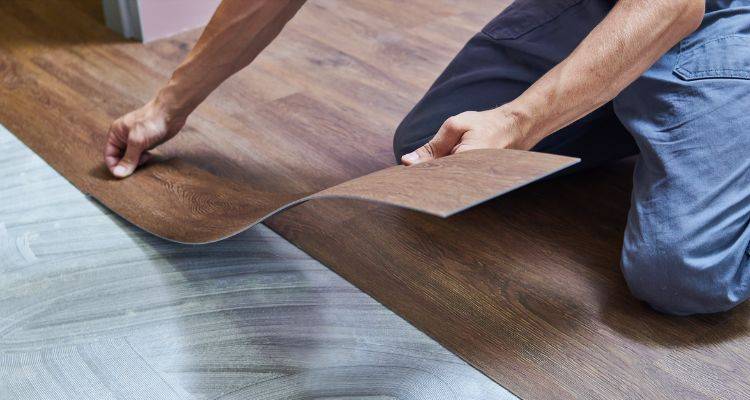
Vinyl flooring is a great option for homeowners looking for cost-effective flooring that's still water-resistant but cheaper than the cost of floor tiles. Standard vinyl flooring costs between £7 and £15 per m², cheaper than the lowest-cost floor tile.
However, this type of vinyl flooring comes in a roll or sheet, which means it can be hard to repair if damages occur as it's one continuous section rather than smaller individual planks or tiles.
Luxury vinyl tile (LVT) flooring is a step up in terms of quality from standard vinyl, and comes in individual planks and tiles for a more authentic look - it also makes it easier to repair if necessary. Because of this, the cost of LVT is higher than standard vinyl, at £25 to £40 per m² for a mid-range tile.
LVT can be a great choice for homeowners wanting a realistic tiled or wooden floor without high prices. Unlike hardwood floors, LVT is still suitable for rooms with moisture, giving you an option if you want a wooden look without any issues with warping or water damage over the years.
Another type of LVT is Karndean flooring, which focuses on creating realistic-looking "natural" materials in their flooring. Because of this, there is a bigger choice in terms of pattern, colour, and design, giving realistic wood and stone effects.
If you want to achieve a realistic stone floor look without the pricetag, Karndean flooring costs between £20 to £50 per m², depending on the exact type you choose.
Laminate Flooring

Laminate flooring gives you the opportunity to have wood-effect flooring in your home without any of the upheaval and cost associated with installing real-wood floors. Faux wood laminate flooring costs as little as £8 per m², but can rise to £45 per m² for more intricate designs.
Wood flooring isn't the only option laminate gives you - you can also opt for faux tiles, too. These are incredibly cost-effective, at just £6 to £8 per m², or for a marble faux tile, you can expect costs of £25 to £35 per m².
Engineered Wood
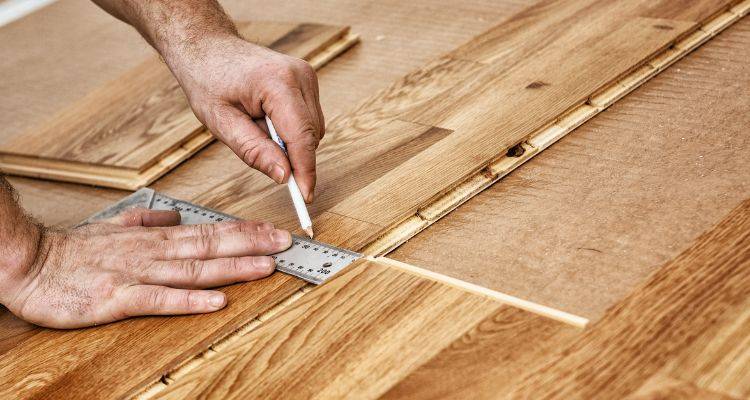
If a faux-wood floor isn't your ideal flooring type, you can opt for engineered wood floors to get the feel of a hardwood floor with increased moisture-resistant benefits.
Engineered wood is made up of different layers, including a real wood top layer, a core layer of softwood, and a bottom layer to help prevent warping. This gives engineered wood an authentic look and feels reminiscent of real wood floors - without any of the high-maintenance properties of real wood.
Because of these benefits, engineered wood prices are higher than some of the faux flooring options at £45 per m². But, if it's an authentic look you're after, engineered wood is one of the best options for kitchens and bathrooms where traditional hardwood might not be suitable.
Checklist: Hiring a Tiler in the UK
There are a few things you will need to consider before hiring someone to install a new wet room for you. Below is a list of some of the main things that you should consider when looking for the right contractor for the job:
- Does the contractor offer any guarantees with their work?
- How much is the work to complete? – Ask for a breakdown of costs so you can ensure you are paying a reasonable price for each element of the job.
- What type of tiles and fittings does the company offer?
- Do you need to supply any materials yourself, or is it all included in the overall price for the job?
- Is the contractor experienced in fitting the type of flooring that you are purchasing?
- How many years’ worth of experience does the contractor have in fitting new flooring?
- How many contractors will carry out the job?
- Will the contractor fix any issues that may arise?
- Will the contractor take care of any relevant waste removal?




